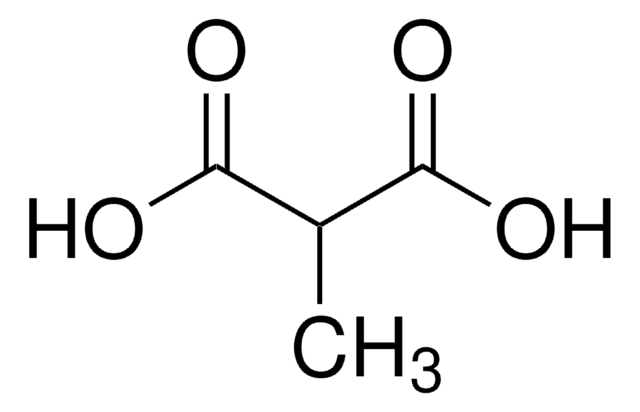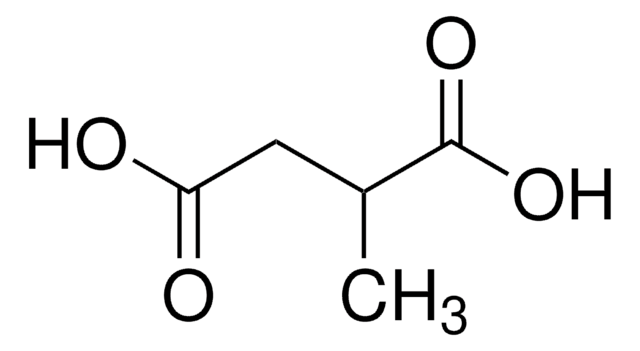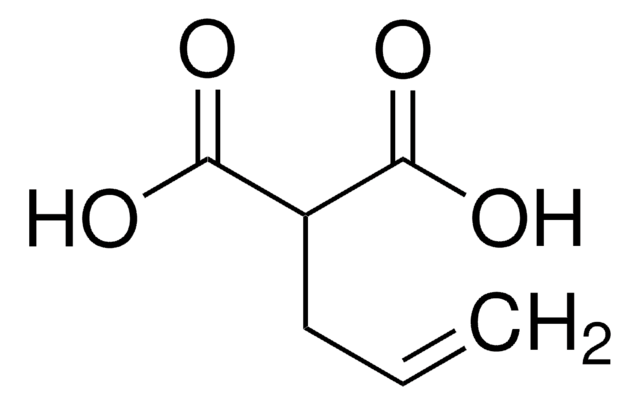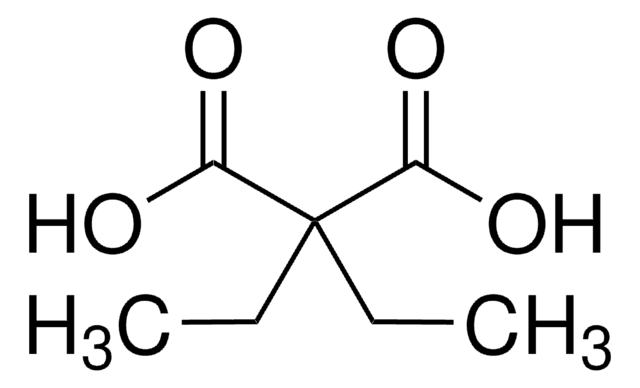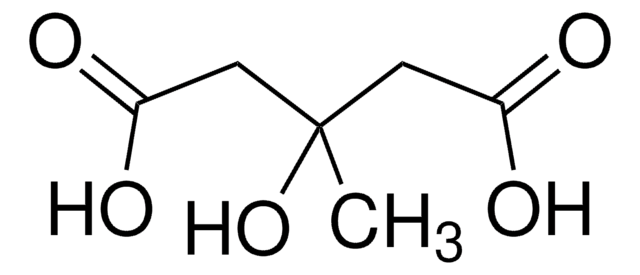102687
Ethylmalonic acid
97%
Synonym(s):
α-Carboxybutyric acid, 2-Ethylpropanedioic acid
Sign Into View Organizational & Contract Pricing
All Photos(1)
About This Item
Linear Formula:
C2H5CH(COOH)2
CAS Number:
Molecular Weight:
132.11
Beilstein:
774334
EC Number:
MDL number:
UNSPSC Code:
12162002
PubChem Substance ID:
NACRES:
NA.23
Recommended Products
Assay
97%
form
solid
mp
112-114 °C (lit.)
SMILES string
CCC(C(O)=O)C(O)=O
InChI
1S/C5H8O4/c1-2-3(4(6)7)5(8)9/h3H,2H2,1H3,(H,6,7)(H,8,9)
InChI key
UKFXDFUAPNAMPJ-UHFFFAOYSA-N
Looking for similar products? Visit Product Comparison Guide
Signal Word
Warning
Hazard Statements
Precautionary Statements
Hazard Classifications
Eye Irrit. 2 - Skin Irrit. 2 - STOT SE 3
Target Organs
Respiratory system
Storage Class Code
11 - Combustible Solids
WGK
WGK 3
Flash Point(F)
Not applicable
Flash Point(C)
Not applicable
Personal Protective Equipment
dust mask type N95 (US), Eyeshields, Gloves
Choose from one of the most recent versions:
Already Own This Product?
Find documentation for the products that you have recently purchased in the Document Library.
Customers Also Viewed
Imad Dweikat et al.
Metabolic brain disease, 27(4), 613-616 (2012-05-16)
Ethylmalonic encephalopathy (EE) is a rare autosomal recessive disorder caused by mutations in the ETHE1 gene and characterized by chronic diarrhea, encephalopathy, relapsing petechiae and acrocyanosis. Nephrotic syndrome has been described in an infant with EE but the renal histology
Christina B Pedersen et al.
Journal of inherited metabolic disease, 33(3), 211-222 (2010-05-06)
Mitochondrial dysfunction and oxidative stress are central to the molecular basis of several human diseases associated with neuromuscular disabilities. We hypothesize that mitochondrial dysfunction also contributes to the neuromuscular symptoms observed in patients with ethylmalonic aciduria and homozygosity for ACADS
Patrícia Fernanda Schuck et al.
Behavioural brain research, 197(2), 364-370 (2008-10-28)
High concentrations of ethylmalonic acid (EMA) are found in tissues and biological fluids of patients affected by ethylmalonic encephalopathy (EE), as well as by deficiency of short-chain acyl-CoA dehydrogenase (SCAD) activity and other illnesses characterized by developmental delay and other
Bianca T van Maldegem et al.
Pediatric research, 67(3), 304-308 (2009-12-03)
Short-chain acyl-CoA dehydrogenase deficiency (SCADD) is an inborn error, biochemically characterized by increased plasma butyrylcarnitine (C4-C) concentration and increased ethylmalonic acid (EMA) excretion and caused by rare mutations and/or common gene variants in the SCAD encoding gene. Although its clinical
Lindsay Tomlinson et al.
Toxicological sciences : an official journal of the Society of Toxicology, 129(2), 268-279 (2012-07-24)
Ibipinabant (IBI), a potent cannabinoid-1 receptor (CB1R) antagonist, previously in development for the treatment of obesity, causes skeletal and cardiac myopathy in beagle dogs. This toxicity was characterized by increases in muscle-derived enzyme activity in serum and microscopic striated muscle
Our team of scientists has experience in all areas of research including Life Science, Material Science, Chemical Synthesis, Chromatography, Analytical and many others.
Contact Technical Service